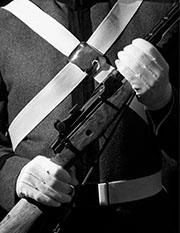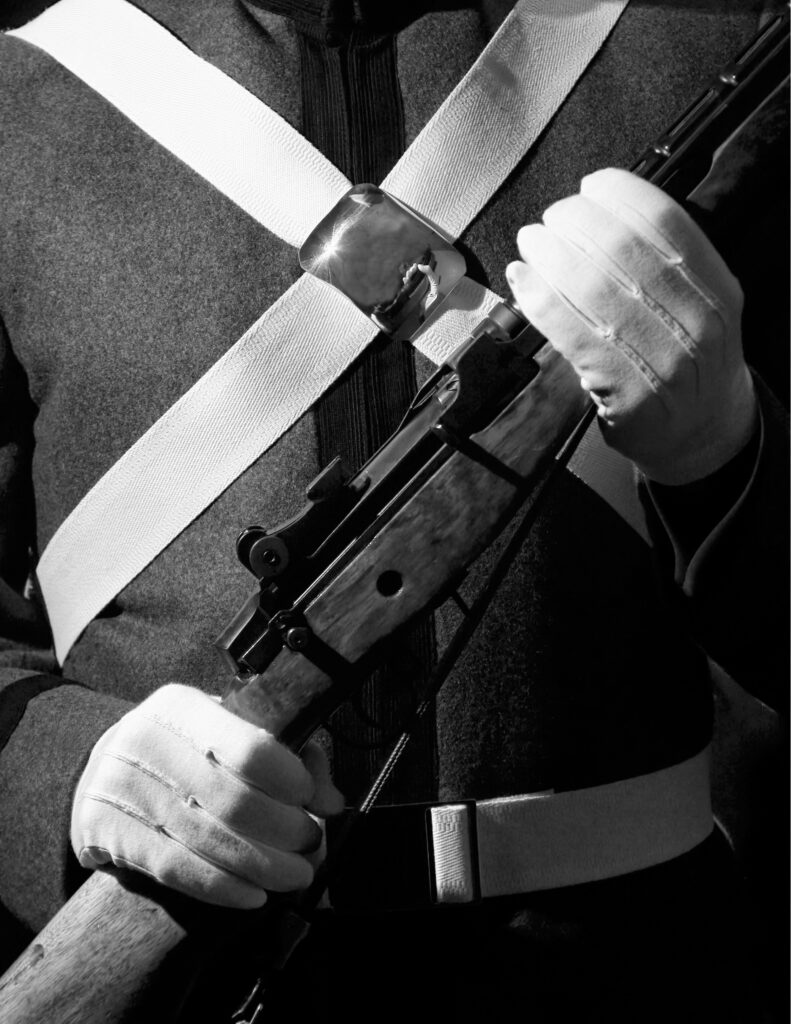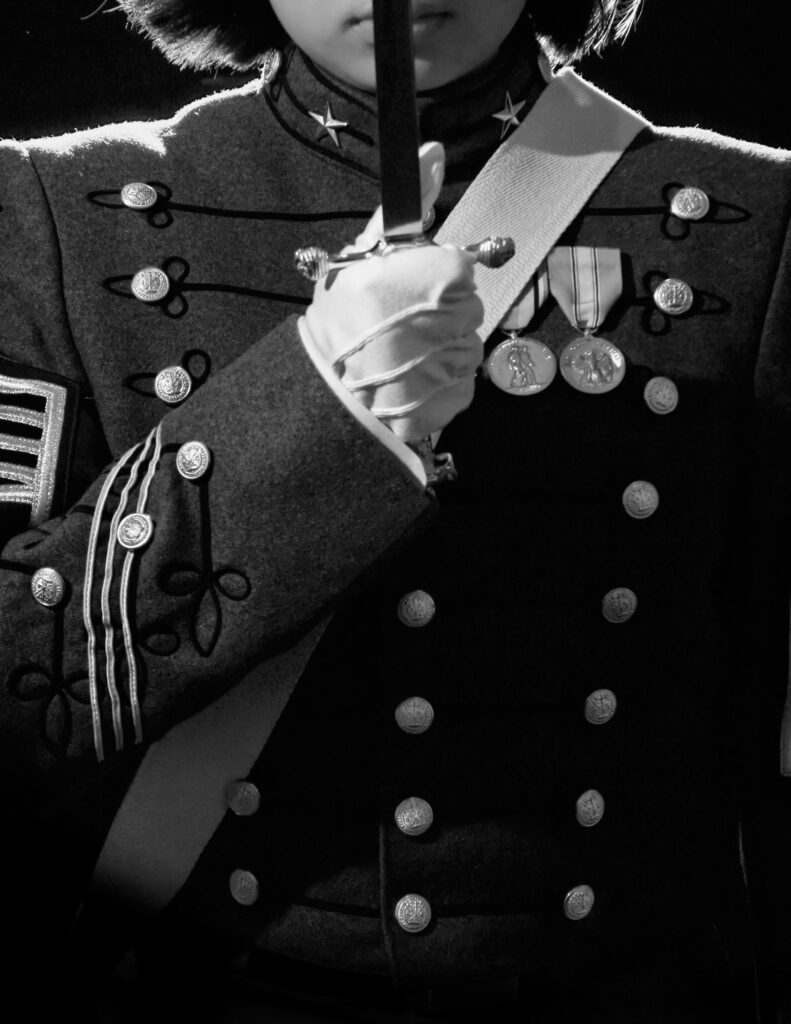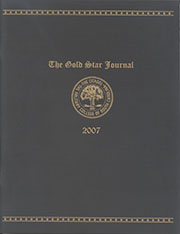Editor-in-Chief
- James M. Russell IV, Class of 2007, Business Administration (Accounting) Major.

The Editors
- Jared S. Newman II, Class of 2008, Criminal Justice Major.
- Leon E. Hontz III, Class of 2009, Political Science (International Politics and Military Affairs) Major.
“We, the editors of the 2007 Gold Star Journal, dedicate this, the eleventh edition, to “Mrs. E” (Mrs. Electa Hoyle of The Daniel Library). She is a truly remarkable woman who has had an enormous influence on the lives of countless cadets. Although our family may be hours away and our friends may be caught up in their daily demands, we know that we will always have a friend within reach with “Mrs. E”. “ – The 2007 Gold Star Journal
To view the entire 2007 edition, click this link or the cover above.
Featured Papers
“Ode to ‘Mrs. E'”, Matthew O. Gryder, Class of 2010, Business Administration Major.
This observational essay was assigned to me last semester by my English 101 teacher Dr. Livingston, a wonderful and inspiring mentor. I had been a cadet for only a few weeks before I began to notice the amazing lady in the library whom I later knew to be “Mrs. E”. After late nights in the library contemplating a topic for the assignment, it dawned on me that the perfect topic was right under my nose the whole time, the true grandmother of The Citadel. Though I kept it a secret from her while it was in progress, she inspired my thoughts more and more as I was writing it. By the end of writing the paper, I felt compelled to share it with her after its submission. I revised the essay, adding and reemphasizing countless times. I still feel that this is not a story that can ever be completely experienced through mere reading, but I did my best to bring honor to “Mrs. E” in all the ways that she has earned it. I hope you can someday meet someone who is as kind and as loving as “Mrs. E” is to me. Enjoy.
“Tupac Shakur and His Effect on American Culture”, Raymond A. Kuderka III, Class of 2007, Criminal Justice Major.
Tupac Shakur, having achieved fame and fortune, could have escaped the ghetto but instead became its spokesman. Tupac spoke for every urban youth who did not have a voice. In the process, he became an image of freedom to the very culture that Tupac felt was responsible for his oppression. Though Tupac’s life was tragically cut short, his legacy still lives on. It transmutes grief to glory; it transforms mourning to celebration; it projects onto his body the hopes and aspirations of all those he fought to protect; and it challenges the very social fabric on which America is built. In the words of Tupac, “there’s no need for you to fear me, if you take your time to hear me, maybe you can learn to cheer me it ain’t about black or white, cause we’re human I hope we see the light before its ruined, my ghetto gospel.”
“All for the Union or All for Profit: New York City’s Role in the American Civil War”, Mark J. Morrison, Class of 2007, History Major.
It would appear that New York City contributed much of its resources towards the preservation of the Union during the American Civil War. However, much of what was done in support of the Union war effort was not based on firm support of the Union or its principles, but instead were the results of internal motives of personal gain or advancement. In addition to economic motives, there were political and social reasons for supporting the war. Service in the war could be used as a platform for political advancement. New York recruiting authorities saw to it that the city’s best citizens saw only limited service, thus gaining a reputation without excessive personal risk. As the war dragged onward the city’s regiments became increasingly filled with foreign born and recently immigrated soldiers. Among the largest contributions of New York City to the war effort was that of its bankers, who stood to gain huge profits through loaning the government money at large interest rates. Contractors who made military equipment also made huge profits during the war, many producing inferior goods at inflated rates. Many New Yorkers owed their fortunes to the war and their lives to the organizations that had protected them from the draft.
“Prisoner Reentry and the Necessity of Community Involvement”, Jared S. Newman II, Class of 2008, Criminal Justice Major.
Taking into account the multifaceted information on the overwhelming numbers of offenders returning to society; the statistics indicating high probabilities of recidivism; and the consequential strains placed on federal and correctional resources, it is ultimately necessary for the community to become engaged in the rehabilitation of ex-offenders. In conjunction with this; in implementing the involvement of community providers in the reentry effort, it is indeed imperative to establish an operational foundation for offender success by providing for cooperative efforts with businesses, pro-social support systems, and family reunification initiatives that will serve to give ex-offenders a sense of efficacy in the community as reformed, productive, and law abiding citizens.
“Generation of Hydrogen from the Water Gas Shift Reaction and Steam Reformation of Hydrocarbons”, Cody S. Sandquist, Class of 2007, Chemistry Major.
Production of hydrogen gas via the water-gas-shift-reaction and steam reformation are the most common methods of producing hydrogen and performed by reacting water with carbon monoxide or hydrocarbon fuels. Hydrogen gas was once used in “hot-air” balloons and in the form of town gas to heat homes. Although natural gas and electricity have replaced town gas, hydrogen production is important today in the hydrogenation of petroleum, vegetable oils and fats. Future applications of hydrogen include its use in proton exchange fuel cells, provided that production costs of hydrogen are competitive with hydrocarbon fuels. Further investigation of new catalysts will decrease the amount of energy required to produce hydrogen through the water-gas-shift-reaction and steam reformation, making the generation of hydrogen more cost effective and a more viable means of coping with energy needs in the future.
“How Succeeding in 4th Generation Warfare Has Increased the Need for Reciprocal Understanding in Today’s Military”, Douglas J. Schmid, Class of 2007, Political Science (International Politics and Military Affairs) Major.
In western warfare it has been common practice to dehumanize one’s enemy in warfare. This dehumanization has led to torture, and poor decision-making with respect to culture throughout history, simply because it is easier to cope mentally. Since the advent of ideological warfare, understanding and humanizing one’s enemy has become increasingly important. The problems in Abu Ghraib, the legal black hole in Guantanamo Bay, and the basing of troops in Saudi Arabia during Operation Desert Shield have sent up ideological exclamations throughout the Muslim world. These events have sent the United States backward in the War on Terror. Unless the Navy- Marine Corps team begins to address more adequately these ideological concerns, they will not be fulfilling their ethical commitment as human beings or their commitment to the American people to be the best fighting force possible.
“Therefore I say: ‘Know the enemy and know yourself; in a hundred battles you will never be in peril.” -Sun Tsu.
The Art of War, Trans. Griffith. New York City. 1963 pg 84.
“Caesar’s Masterpiece in Conquest: The Gallic Wars”, Thomas J. Sullivan III, Class of 2010, Biology Major.
In the years 58 to 50 B.C., one of history’s most powerful and effective military leaders, Julius Caesar, led a military campaign in Gaul. Through this conquest Caesar would not only Romanize Gaul and its people, but initiate the decline of the Roman Republic and the birth of the Roman Empire. In addition, the conquest also brought light to a section of Europe that until then had been unknown to the Mediterranean. Gaul had become a powerful and advanced civilization; one that until Caesar’s arrival had remained relatively untouched by Roman conquerors. Caesar’s conquest in Gaul opened an entire civilization to Roman influence, demonstrated a new level of military campaigning, and provided a crucial stepping stone in Caesar’s rise to power.
Featured Photographs
Josh Simon, 2008, Business Administration Major.


2007 Edition Donors
The 2007 edition was made possible by donations from the following individuals and groups:
- The Citadel Foundation
- Thomson
- McGraw – Hill
- Houghton – Mifflin
- John Wiley and Sons

